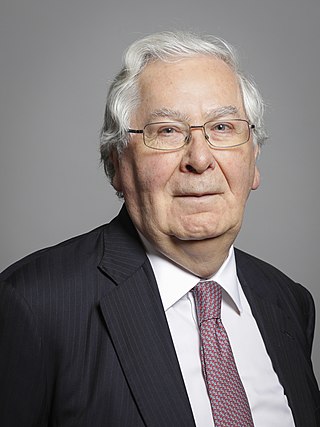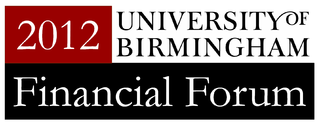
Mervyn Allister King, Baron King of Lothbury is a British economist and public servant who served as the Governor of the Bank of England from 2003 to 2013. He is a School Professor of Economics at the London School of Economics. He is also the Chairman of the Philharmonia.

Sir Charles Richard Bean is a British economist and Professor of Economics at the London School of Economics. He was previously Deputy Governor for Monetary Policy at the Bank of England from 1 July 2008 until 30 June 2014. From 2000 to 2008, he served as Chief Economist at the Bank.

Timothy Douglas Harford is an English economic journalist who lives in Oxford.
Sir John Stuart Vickers is a British economist and the Warden of All Souls College, Oxford.

Lawrence Henry White is an American economics professor at George Mason University who teaches graduate level monetary theory and policy. He is considered an authority on the history and theory of free banking. His writings support the abolition of the Federal Reserve System and the promotion of private and competitive banking.

Frederic Stanley "Rick" Mishkin is an American economist and Alfred Lerner professor of Banking and Financial Institutions at the Graduate School of Business, Columbia University. He was a member of the Federal Reserve Board of Governors from 2006 to 2008.

Willem Hendrik Buiter CBE is an American-British economist. He spent most of his career as an academic, teaching at various universities. More recently, he was Chief Economist at Citigroup.

Charles Albert Eric Goodhart, is a British economist. His career can be divided into two sections: his term with the Bank of England and its associated public policy; and his academic work with the London School of Economics. Charles Goodhart's work focuses on central bank governance practices and monetary frameworks. He also conducted academic research into foreign exchange markets. He is best known for formulating Goodhart's Law, which states: "When a measure becomes a target, it ceases to be a good measure."
Carl Eugene Walsh, is an American economist. He has been an economics professor at the University of California, Santa Cruz (UCSC) since 1987, and retired in 2020 as Distinguished Professor of Economics. He twice served as chair of the Economics Department at the university as well as Vice Provost for Silicon Valley Initiatives (2005-2007) and Associate Vice Chancellor for Planning and Programs (1995-1995) at UCSC. He has also been a Visiting Scholar at the Federal Reserve Banks of Kansas City (1982-1983), Philadelphia (1984-1985) and San Francisco (1987-2000).

Sir David Edward John Ramsden CBE is a British economist and has been Deputy Governor for Markets and Banking at the Bank of England since 4 September 2017. He was previously Chief Economic Adviser to HM Treasury and Head of the Government Economic Service, having previously served as Joint Head of the Service with Vicky Pryce, formerly Chief Economic Adviser and Director-General at the Department for Business, Innovation and Skills.
Philip Richard Lane is an Irish economist who has been serving as a member of the Executive Board of the European Central Bank since 2019 and concurrently as ECB chief economist. He previously served as Governor of the Central Bank of Ireland from 2015 to 2019. As ECB Chief Economist, Lane is seen by many as providing an academic counterweight to the traditional political abilities of ECB President, Christine Lagarde.

Peter Bofinger is a German economist and a former member of the German Council of Economic Experts.

Frank Horace Hahn FBA was a British economist whose work focused on general equilibrium theory, monetary theory, Keynesian economics and critique of monetarism. A famous problem of economic theory, the conditions under which money, which is intrinsically worthless, can have a positive value in a general equilibrium, is called "Hahn's problem" after him. One of Hahn's main abiding concerns was the understanding of Keynesian (Non-Walrasian) outcomes in general equilibrium situations.
Richard Andreas Werner is a German banking and development economist who is a university professor at University of Winchester.

Andrew George Haldane is a British economist who worked at the Bank of England between 1989 and 2021 as the chief economist and executive director of monetary analysis and statistics. He resigned from the Bank of England in June 2021 to become chief executive of the Royal Society for Arts. He sits on the UK's government's Economic Advisory Council.

The University of Birmingham Financial Forum is a student-run conference for hundreds of students that was founded in 2011 and held at the University of Birmingham, United Kingdom.
Stephen G Cecchetti is an American economist who has been the Barbara and Richard M Rosenberg Professor of Global Finance at Brandeis International Business School. His principal fields of interest are macroeconomics, monetary economics, financial economics, monetary policy, central banking, and the supply of money.
Michael David Bordo is a Canadian and American economist, currently Board of Governors Professor of Economics and Distinguished Professor of Economics at Rutgers University. He is a research associate at the National Bureau of Economic Research as well as a Distinguished Visiting Fellow at the Hoover Institution at Stanford University. He is the third most influential economic historian worldwide according to the RePEc/IDEAS rankings. He was a student of Milton Friedman and has co-authored numerous books and articles with Anna Schwartz.
The Department of Economics is an academic department of the University of Oxford within the Social Sciences Division. Relatively recently founded in 1999, the department is located in the Norman Foster-designed Manor Road Building.
Előd Takáts is a Hungarian economist, professor, former senior economist at the Bank for International Settlements and visiting professor at the London School of Economics and Political Science. He has been serving as rector of Corvinus University of Budapest since 1 August 2021.











